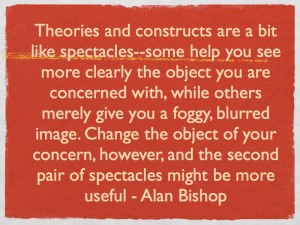 Margaret Eisenhart (1991) has identified three types of research frameworks: theoretical, practical, and conceptual.
Margaret Eisenhart (1991) has identified three types of research frameworks: theoretical, practical, and conceptual.
Theoretical Frameworks
A theoretical framework guides research activities by its reliance on a formal theory; that is, a theory that has been developed by using an established, coherent explanation of certain sorts of phenomena and relationships—Piaget’s theory of intellectual development and Vygotsky’s theory of socio-historical constructivism are two prominent theories used in the study of children’s learning. At the stage in the research process in which specific research questions are determined, these questions would be rephrased in terms of the formal theory that has been chosen. Then, relevant data are gathered, and the findings are used to support, extend, or modify the theory.
Practical Frameworks
This kind of framework is not informed by formal theory but by the accumulated practice knowledge of practitioners and administrators, the findings of previous research, and often the viewpoints offered by public opinion. Research questions are derived from this knowledge base and research results are used to support, extend, or revise the practice (Scriven, 1986)
A practical framework guides research by using “what works” in the experience of doing something by those directly involved in it.
Conceptual Frameworks
A conceptual framework is an argument that the concepts chosen for investigation, and any anticipated relationships among them, will be appropriate and useful given the research problem under investigation. Like theoretical frameworks, conceptual frameworks are based on previous research, but conceptual frameworks are built from an array of current and possibly far-ranging sources. The framework used may be based on different theories and various aspects of practitioner knowledge, depending on what the researcher can argue will be relevant and important to address about a research problem.
What do you think are the advantages and disadvantages of each type of framework?
Source:
Lester, Frank. On the theoretical, conceptual, and philosophical foundations for research in mathematics education. ZDM 2005 Vol. 37 (6)
